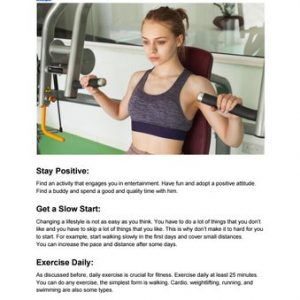When it comes to getting healthy, many of us can often feel overwhelmed and confused about where to start. All you may hear about is which crash diet to hop on, with all kinds of fads and quick solutions that can leave you feeling deprived. But what if there was a better way of getting healthy that you would actually enjoy? In this article, we’ll explore some smart ways to avoid unnecessary dieting so you can start feeling healthier and happier without depriving yourself. Let’s get started!
My Contents
- 1) Embrace Movement, Not Extreme Dieting
- 2) Peeking into Your Motivations
- 3) Eating for Balance and Enjoyment
- 4) Finding Satisfaction Beyond Your Plate
- 5) Unnecessary Dieting – Smarter Choices to Make
- My Diet Answers
1) Embrace Movement, Not Extreme Dieting
Nutrition is Key
When it comes to getting healthy, nutrition plays a huge role. If your goal is to lose weight, then focus more on the food you are eating rather than trying a strict diet with lots of restrictions and forbidden foods. Eating the right foods and not overeating can help you understand your body’s needs and how to meet them in a fulfilling way. It is so important to take notice of the foods and drinks you are putting into your body!
Work Out Wisely
Exercising is highly beneficial – not only for weight loss, but overall physical and mental health. Experiment with different types of activities and different intensities to see which ones you enjoy the most. Find a balance that you are comfortable with and will make it work for you in the long-run. Aim for slow steady progress, not quick-fix solutions that don’t last. Mentally, it’s healthier to keep going steady, than to try an extreme approach and be over it after a week.
Staying On Track
The biggest part of embracing a healthy lifestyle is consistency. Start with small achievable goals for yourself and break them down into simpler tasks. Creating simple achievable goals and routines that you can stick to is the key for long-term success! Here are some helpful tips that you can use to stay on track:
- Drink lots of water
- Take a 10-minute walk daily
- Eat lots of vegetables and fruits
- Switch to whole-grain foods
- Invest in a workout or yoga class
- Prepare meals at home as often as possible
Remember to trust the process and be patient with yourself. Keep focused on your goals while remaining compassionate and understanding towards yourself. Yes, it takes work and dedication, but the rewards of trusting and embracing a healthy lifestyle are worth it!
2) Peeking into Your Motivations
We’ve all heard many times that understanding why we do things is the first step to achieving success. But it can also be one of the hardest steps to take! It’s not easy to peep into our minds and uncover what really motivates us down to our core.
The good news is, you don’t need to get your degree in psychology and bore yourself to death in order to take a deep look into what motivates you. All you have to do is remember a few things:
- Go along with your gut: Your gut feelings can help you give your best, so don’t ignore them! Listen to your instincts and give yourself permission to tap into the power of your emotions.
- Make it personal: Remember that you can only be motivated by something that matters to you. It’s okay to find your own reasons and to get excited about them.
- Track your progress: Don’t forget to keep track of how far you’ve come and all the things you have achieved. Observing how your attitudes and behaviors have changed over time will help you stay focused and motivated.
The best part is that peeking into your motivations can help you not only achieve a specific goal, it can also help you develop a healthier lifestyle and find a greater appreciation for the little things in life.
3) Eating for Balance and Enjoyment
We all want to feel our best, and for many of us, that means eating a balanced diet full of healthy, whole, nutritious foods. But healthy eating shouldn’t mean giving up flavor and enjoyment. Balance and enjoyment go hand-in-hand. Here are some simple tips to keep in mind when you’re creating your meals.
1. Get Creative! Food can be as delicious as it is nutritious. Play with different flavors, textures, and colors to create meals that are both nutritious and tasty. Create your own signature dishes that are unique and interesting. From wraps loaded with veggies to flavorful soups with plenty of herbs, you can make tasty, satisfying meals with minimal effort.
2. Include Healthy Fats Even healthy fats like olive oil, avocado, and coconut-based products can add much-needed flavor and texture to your meals. Not only that, these healthy fats add essential vitamins and minerals that can help you feel more energized and more satisfied after a meal.
3. Make it Fun Eating should be enjoyable and fun! Whether you get creative in the kitchen or head out to your favorite restaurant, make meals something to look forward to. Invite your friends or family – chances are, they’ll appreciate a tasty meal, too!
- Explore different flavors, textures, and colors
- Include healthy fats for nourishment and flavor
- Make meals fun by dining out or cooking together
4) Finding Satisfaction Beyond Your Plate
Cooking is a source of joy for some and dread for others. No matter which side of the fence you land on, it is essential to find satisfaction in places beyond what you put on your plate.
Where does one find that satisfaction? Three major areas to focus on include the following:
- Depth of knowledge: Broaden your understanding of the food that you can put together. Get to know the culinary techniques and ingredients that are available to you. Try your hand at small experiments in the kitchen to see what works and what doesn’t. Being able to recognize the difference between a smooth sauce and a chunky one can help you strengthen your connection with food.
- Develop listening skills: Use cooking as a way to strengthen your ability to listen, both to yourself and others. Pay attention to your own tastes and preferences, alongside the advice of those who have been cooking for a longer time than you. Despite different methods, the goal of creating something delightful remains.
- Share!: Learn the art of collaboration when it comes to cooking. Discover the joy in giving each other tips and feedback about what works well. Sharing not just the food but also the process for creating it can be a rewarding experience.
By changing our outlook on cooking, we can find a much greater satisfaction in all stages of the process. Not only will it be an enjoyable experience that you can look forward to every day, but it will also help create a healthier relationship with food.
5) Unnecessary Dieting – Smarter Choices to Make
When it comes to your health, there is no need for unnecessary dieting. As much as commercialized diet plans may promise quick results, a smarter solution lies within sustainable nutrition habits and lifestyle choices. Rather than feeling pressured to keep up with the latest trend, follow these tips to make healthier and wiser decisions.
- Monitor your serving size. Most of the time, people feel hungry because they’re not eating enough at mealtime. To ensure you are eating the right amount, pay attention to the portion you’re served and adjust it according to your appetite.
- Eat mindfully. Before you start mindlessly munching your way through snacks, ask yourself if your body needs the food. Instead of eating out of boredom or because it’s available, be attentive to the signal your body is sending out. When it tells you it’s had enough, listen!
- Look beyond the labels. If you’re watching calories, don’t get too focused on them. Choose foods that nourish your body with the right amount of nutrients and fiber. Avoid processed foods that tend to be fatty and sugary.
If you’re feeling tempted to give in to basic dieting rules, don’t feel discouraged. Make smarter choices today and you will be able to enjoy a healthier lifestyle tomorrow. At the end of the day, it’s not just about calorie counting, it’s about forming healthier habits for the long run.
My Diet Answers
Q: What dieting tip should I follow if I don’t want to diet unnecessarily?
A: Eating mindfully and listening to your body are great ways to make sure you’re not dieting unnecessarily. Start by tracking your eating patterns and looking out for any subtle signs that you may be overeating. Then, focus on eating when you’re genuinely hungry and stopping when you’re satisfied. This will help you develop a healthier perspective on food and overall wellbeing.
Q: Should I count calories if I’m trying to avoid unnecessary dieting?
A: Counting calories isn’t a necessary step in avoiding unnecessary dieting. In fact, obsessively counting calories can be an indicator of disordered eating, and you don’t want to go down that path. Instead, focus on listening to your body’s cues so that you know when it’s time to eat and when you’re satisfied. Your body will thank you for it!
Q: What can I do if I have a sweet tooth and want to avoid unnecessary dieting?
A: The key to avoiding unnecessary dieting and still satisfying your sweet tooth is moderation. Instead of cutting out sugars and desserts entirely, allow yourself to enjoy them in small portions from time to time. This way, you’ll get to enjoy your favorite treats without guilt and won’t have to worry about your diet.
Now you’re well-poised to make smart decisions around food and eating habits that will save you from unnecessary dieting. Remember, restriction is not the only pathway to success. Enjoying your food and having flexibility in your diet can lead you to a healthier lifestyle.










